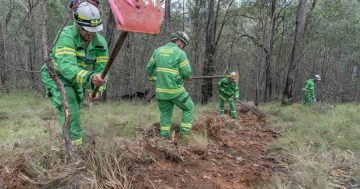
Victorian ANMF members at a recent rally. Photo: ANMF.
Members of the Australian Nursing and Midwifery Federation (ANMF) have voted to reject the latest offer from the Victorian Government on a proposed enterprise bargaining agreement (EBA) despite the union and the government reaching an in-principle agreement on the EBA late last week.
The 20 May vote to reject the offer was the latest action by ANMF members. Following an initial offer in April that was rejected, ANMF members held an action ballot on 29 April, which saw 96 per cent of members support action from 7 May.
The Stage 1 industrial action included wearing red campaign T-shirts, a refusal to work overtime, talking to patients about the campaign, stopping work to post campaign messages on social media, and administrative paperwork bans, while hospital-in-the-home and community nurses wrote messages on work car windows.
If it had progressed to Stage 2, action would have included the closure of one in four beds, cancellation of one in four elective surgeries, and stop-work meetings.
“We thank the ANMF and the Victorian Hospitals Industrial Association for bargaining in good faith,” a 17 May Victorian Government statement about the in-principle agreement said.
“We will always back our nurses and midwives and the extraordinary work they do to provide Victorians with world-class care – keeping each and every one of us healthy and safe.”
The agreement had guaranteed a minimum wage increase of between 18 and 23 per cent over the life of the four-year proposed agreement. This would have included a cash benefit uplift of 6 per cent in the first three months of the first year, government wages policy and a further cash payment in the second year, plus wages policy in the third and fourth years.
It also provided for a new wage percentage outcome subject to Fair Work Commission (FWC) Justice Adam Hatcher and his expert panel’s decision on the aged-care work value case for Victorian nurses – expected to be between 5.5 percent and 13 percent.
The ANMF said the offer also included a range of improved and new allowances and penalties designed to retain and grow a permanent nursing and midwifery workforce.
But, it said, the in-principle agreement was complicated by a component of the wage offer that relied on the outcome of the FWC aged-care work value case, which had already determined gender undervaluation in nurses’ award rates.
ANMF (Victorian branch) secretary Lisa Fitzpatrick said there was significant support for the majority of the improvements that had been negotiated, but the members wanted the pay rates over the life of the agreement in black and white.
“They also want the Allan Government’s commitment to retain relativities of the FWC case outcome across the classifications in the nurses and midwives enterprise agreement,” she said.
“The union will take the members’ message back to government and require further negotiations.”
The ANMF said State 1 action would continue, but any plans to begin State 2 had been suspended.











